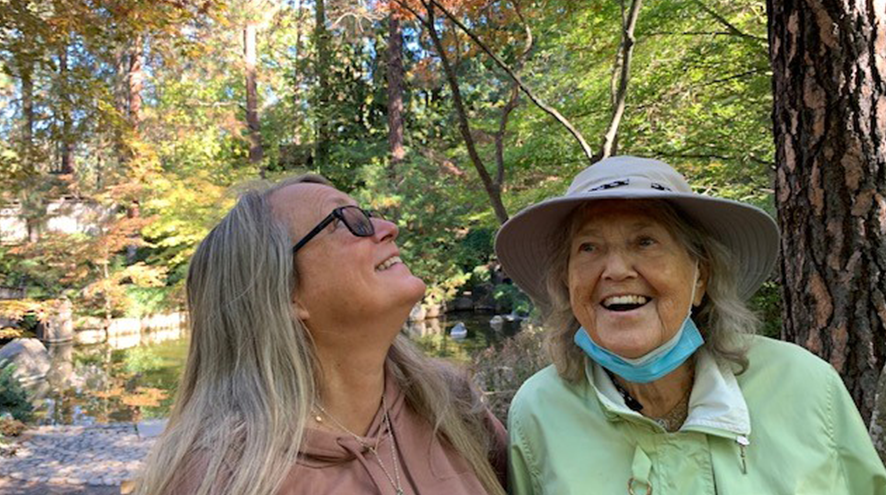Don't change: Lori Smith's story
Meet one of the British Columbians sharing their stories as part of Alzheimer’s Awareness Month this year.

Throughout January, the Alzheimer Society of B.C. is recognizing Alzheimer’s Awareness Month by highlighting the experiences of British Columbians affected by dementia to say, “Don’t change. Even if they do.” For many people living with dementia and their caregivers, the dementia journey can feel very isolating. Sustaining relationships is essential for the well-being of people facing the disease, whether they live in the community or in long-term care.
This year, British Columbians are sharing their input on the value of staying connected to the people in their lives who are living with dementia or caring for someone who is. Among them is Lori Smith, a caregiver who worked for years as a registered nurse in Trail, B.C.
Lori’s mother, Donna, is living with dementia. “My brother, sister and I started to notice what we thought might be symptoms of dementia,” Lori says. “We were concerned about Mom driving by herself.” Getting a diagnosis was not straightforward; after initially being referred to mental health services and receiving some unhelpful advice, Lori secured a referral to a specialized geriatric clinic in New Westminster.
“They interviewed Mom, gave her a test and diagnosed her with Alzheimer’s disease,” Lori says. The reality of the diagnosis came as a shock to Lori and her family. Conscious about her health, Donna was diagnosed at the age of 87 and had an active, independent lifestyle, embraced physical activity and mental stimulation, and was careful about her blood pressure and cholesterol. The family connected with a nurse who went over the services available to people living with dementia in the community. “There wasn’t much out there for someone like my mom, who lived alone.”
Donna wanted to live on her own for as long as possible, maintaining connections through visits with Lori’s brother, who lived with his family nearby. However, the family found navigating the system and finding appropriate home support for Donna difficult, largely because Donna was still able to care for herself and Lori was advised to call back when Donna hit a crisis point. Eventually, Donna couldn’t live on her own anymore and spent time living with each of her children – both in B.C. and Ontario – before settling down with Lori, who was dividing her time between Rossland and Washington State.
Accessing services was already challenging before COVID-19. The average wait time for a bed in a residence suitable for Donna is one to two years in Vancouver and Toronto. They found very few places that offered specialized care for active people living with dementia, with the monthly costs between $6,000.00 to 12,000.00.
The pandemic has further complicated the family’s dementia journey. “Community care is extremely limited,” Lori says. “Even hiring private home care was risky before vaccinations. The border closure excluded Donna from staying in Washington and has made it difficult to travel to see her in Vancouver.”
“Mom copes by living each day as if she is still independent – that’s how she maintains her cheerful, positive outlook,” Lori says. “As caregivers, we try to support her by anticipating her needs and giving her opportunities for independence.”
Lori has become an advocate for change because of her family’s experiences throughout the progression of Donna’s disease – from their difficulties in getting an actual diagnosis to finding adequate care for her. There have been complications at every step – and moving around within B.C. and outside of it has shown Lori that the issues are systemic and need to be addressed everywhere. She recognizes dementia needs national attention and action. “There need to be innovative measure to care for and support people living with the disease and their families,” she says. “Its not the fault of the people doing the work,” she says. “They’re doing the best they can.”
The family’s journey has been eye-opening for Lori, who reflects on the fact that her decades of experience as a registered nurse didn’t prepare her for it. “Even when someone has experience working within the system, this is a huge challenge,” she says. “What must it be like for others?”
Learn more about the campaign
Want to learn more? Read some of the other stories being shared throughout the month and visit dontchange.ca to find out more about the campaign.
